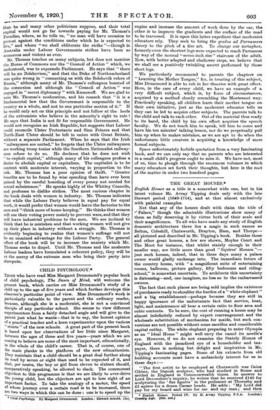CHILD PSYCHOLOGY.* TuosE who have read Miss Margaret Drummond's popular
book of child psychology, The Daunt of Mind, will welcome the present book, which carries on Miss Drummond's study of a child up to the age of five years and which further develops this observer's particular point of view. Miss Drummond's work is Particularly valuable to the parent and the ordinary reader, because, although she is a modernist, she is not a convinced disciple of any particular school. She seems to view different experimenters from a fairly detached angle and will give to the parent just what he wants—that is to say, the honest opinion of a practical teacher and a keen experimenter upon the various "
stunts" of the new schools. A great part of the present book is based upon her observations of her little niece Margaret, between the ages of three and five years—years which we are coming to believe are some of the most important, educationally, In the whole of the child's career. That is, of course, one of the main planks in the platform of the new educationists. They maintain that a child should be a great deal further along it road by seven or eight than used to be expected of it, and that, per contra, the boy or girl from eleven to sixteen should, comparatively speaking, be allowed to slack. The commonest objection to this programme is that we are likely to over-drive the young child, but the objectors are apt to lose sight of an important factor. To take the analogy of a motor, the speed of whose journey over a certain road is to be increased, there are two ways in which this can be done : one is to speed up the • Child Psychology. By Margaret Drummond. London : Edward Arnold. 153.1,
engine and increase the amount of work done by the car, the other is to improve the gradients and the surface of the road to be traversed. It is upon this latter expedient that modernist educators rely. They seek to bring the gradas ad Parnassum theory to the pitch of a fine art. To change our metaphor, formerly even the shortest legs were expected to reach Parnassus by way of the normal "seven-inch rise" staircase of the adult. Now, with better adapted and shallower steps, we believe that we shall see a positively twinkling ascent performed by those short legs.
We particularly recommend to parents the chapters on "Learning the Mother Tongue," for, in treating of this subject, Miss Drummond is able to rub in her theories with great effect. Here, in the case of every child, we have an example of a very difficult subject, which is, by force of circumstances, acquired by a method closely resembling the Montessori way. Practically speaking, all children learn their mother tongue on their own initiative, just as the modernist educator tells us they can be led to acquire other subjects. The parents talk to the child and talk to each other. Out of the material thus ready to its hand, the child by his own effort acquires the speech faculty. We do not teach him to speak, tell him to come and have his ten minutes' talking lesson, nor do we perpetually pull him up when he makes mistakes, as we are apt to do when the unfortunate little creature is acquiring a knowledge of more formal subjects.
Space unfortunately forbids quotation from a very fascinating book, and we can only say that no parents who are interested in a small child's progress ought to miss it. We have not, most of us, time to plough through the enormous volumes in which many educators set forth their thoughts, but here is the root of the matter in under two hundred pages.






































 Previous page
Previous page